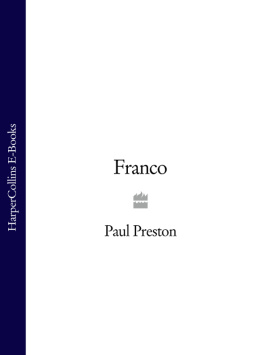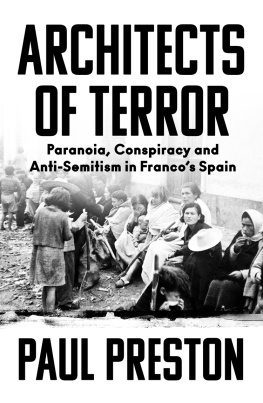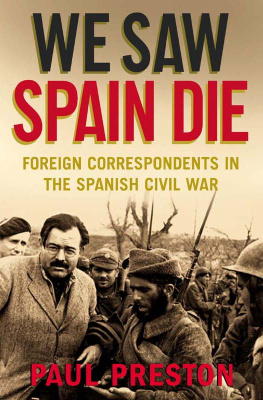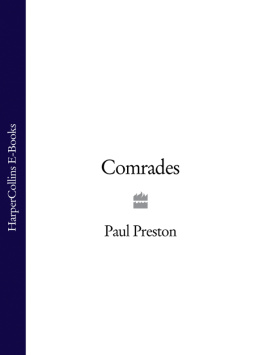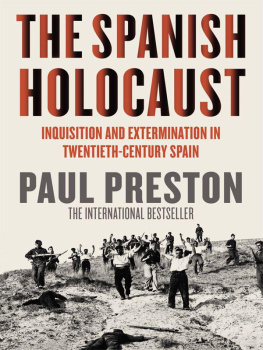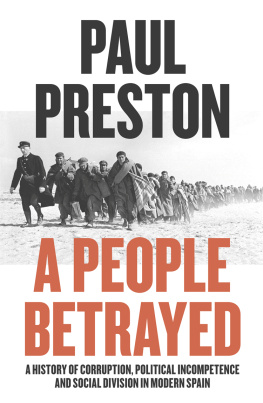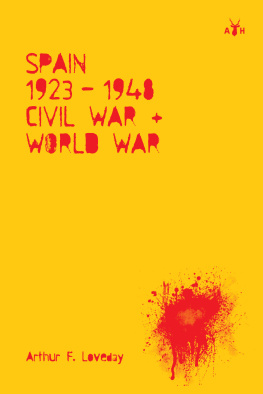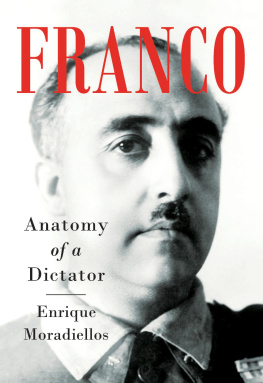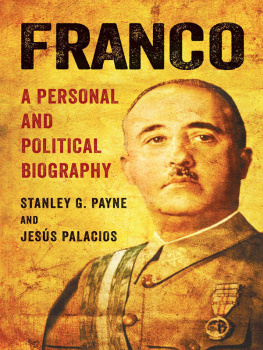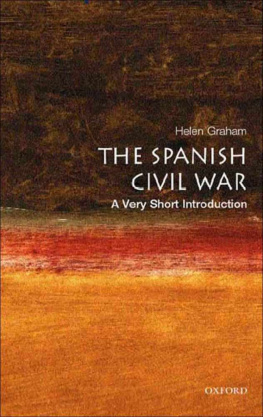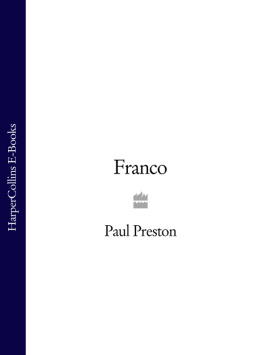Paul Preston - Franco: A Biography
Here you can read online Paul Preston - Franco: A Biography full text of the book (entire story) in english for free. Download pdf and epub, get meaning, cover and reviews about this ebook. year: 1994, publisher: Basic Books, genre: Detective and thriller. Description of the work, (preface) as well as reviews are available. Best literature library LitArk.com created for fans of good reading and offers a wide selection of genres:
Romance novel
Science fiction
Adventure
Detective
Science
History
Home and family
Prose
Art
Politics
Computer
Non-fiction
Religion
Business
Children
Humor
Choose a favorite category and find really read worthwhile books. Enjoy immersion in the world of imagination, feel the emotions of the characters or learn something new for yourself, make an fascinating discovery.
- Book:Franco: A Biography
- Author:
- Publisher:Basic Books
- Genre:
- Year:1994
- Rating:5 / 5
- Favourites:Add to favourites
- Your mark:
- 100
- 1
- 2
- 3
- 4
- 5
Franco: A Biography: summary, description and annotation
We offer to read an annotation, description, summary or preface (depends on what the author of the book "Franco: A Biography" wrote himself). If you haven't found the necessary information about the book — write in the comments, we will try to find it.
Franco: A Biography — read online for free the complete book (whole text) full work
Below is the text of the book, divided by pages. System saving the place of the last page read, allows you to conveniently read the book "Franco: A Biography" online for free, without having to search again every time where you left off. Put a bookmark, and you can go to the page where you finished reading at any time.
Font size:
Interval:
Bookmark:

For James and Christopher
The Enigma of General Franco
DESPITE fifty years of public prominence and a life lived well into the television age, Francisco Franco remains the least known of the great dictators of the twentieth century. That is partly because of the smoke screen created by hagiographers and propagandists. In his lifetime, he was compared with the Archangel Gabriel, Alexander the Great, Julius Caesar, Charlemagne, El Cid, Charles V, Philip II, Napoleon and a host of other real and imaginary heroes.
Such adulation may be dismissed as typical of the propaganda machine of a despotic regime. Nonetheless, there were many who spontaneously accepted these comparisons and many others, who by dint of their relentless repetition, failed to question them. This is not an obstacle to knowing Franco. What does render him more enigmatic is the fact that Franco saw himself in the inflated terms of his own propaganda. His inclination to compare himself to the great warrior heroes and empire-builders of Spains past, particularly El Cid, Charles V, Philip II, came to be second nature, and only partly as a consequence of reading his own press or listening to the speeches of his supporters. That Franco revelled in the
The inflated judgements of the Caudillo and his propagandists are at the other extreme from the left-wing view of Franco as a vicious and unintelligent tyrant, who gained power only through the help of Hitler and Mussolini, and survived for forty years through a combination of savage repression, the strategic necessities of the great powers and luck. This view is nearer the truth than the wild panegyrics of the Falangist press, but it explains equally little. Franco may not have been El Cid but was neither so untalented nor so lucky as his enemies suggest.
How did Franco get to be the youngest general in Europe since Napoleon? How did he win the Spanish Civil War? How did he survive the Second World War? Does he deserve credit for the great Spanish economic growth of the 1960s? These are important questions with a crucial bearing on Spanish and European history in the twentieth century and they can be answered only by close observation of the man. He was a brave and outstandingly able soldier between 1912 and 1926, a calculating careerist between 1927 and 1936, a competent war leader between 1936 and 1939 and a brutal and effective dictator who survived a further thirty-six years in power. Even close observation, however, has to grapple with mysteries such as the contrast between the skills and qualities required to achieve his successes and a startling intellectual mediocrity which led him to believe in the most banal ideas.
The difficulties of explanation are compounded by Francos own efforts at obfuscation. In maturity, he cultivated an impenetrability which ensured that his intentions were indecipherable. His chaplain for forty years, Father Jos Mara Bulart, made the ingenuously contradictory comment that perhaps he was cold as some have said, but he never showed it. In fact, he never showed anything. The key to Francos art was an ability to avoid concrete definition. One of the ways in which he did that was by constantly keeping his distance, both politically and physically. Always reserved, at innumerable moments of crisis throughout his years in power, Franco was simply absent, usually uncontactable while hunting in some remote sierra.
Raza was merely the most extreme, and self-indulgent, manifestation of Francos tireless efforts to create a perfect past. Like his war diary of 1922, it provides invaluable insight into his psychology. In his scattered writings and thousands of pages of speeches, in his fragments of unfinished memoirs and in innumerable interviews, he endlessly polished his role and remarks in certain incidents, consistently putting himself in the best light and providing the raw material to ensure that any biography would be hagiography. The persistence of many favourable myths is a testimony to his success.
The need to tamper with reality which is revealed by Francos tinkering with his own past was indicative of considerable insecurity. He dealt with this not just in his writings but also in his life by creating for himself successive public personae. The security provided by these shields permitted Franco almost always to seem contained and composed. Everyone who came into contact with him remarked on his affably courteous, but always distant, manner. Behind the public display, Franco remained intensely private. He was abundantly imbued with the inscrutable pragmatism or retranca of the gallego peasant. Whether that was because of his origins as a native of Galicia, or the fruit of his Moroccan experiences is impossible to say. Whatever its roots in Franco, retranca may be defined as an evasion of commitment and a taste for the imprecise. It is said that if you meet a gallego on a staircase, it is impossible to deduce if he is going up or down. Franco perhaps embodied that characteristic more than most gallegos. When those close to him tried to get hints about forthcoming ministerial changes, they were rebuffed with skill: People are saying that in the next reshuffle of civil governors so-and-so will go to Province X, tries the friend; Really? replies the sinuous Franco, Ive heard nothing. Its being said that Y and Z are going to be ministers, ventures his sister. Well, replies her brother, I havent met either of them.
The monarchist aviator Juan Antonio Ansaldo wrote of him Franco is a man who says things and unsays them, who draws near and slips away, he vanishes and trickles away; always vague and never clear or
Mussolinis Ambassador Roberto Cantalupo met him some months later and found Franco to be icy, feminine and elusive [sfuggente].
In his detailed chronicles of their almost daily contact during more than seventy years of friendship, his devoted cousin and aide-de-camp, Francisco Franco Salgado-Araujo, Pacn, presents a Franco who issued instructions, recounted his version of events or explained how the world was threatened by freemasonry and Communism. Pacn never saw a Franco open to fruitful dialogue or to creative self-doubt. Another lifelong friend, Admiral Pedro Nieto Antnez, presented a similar picture. Born, like Franco, in El Ferrol, Pedrolo was to be successively ADC to the Caudillo in 1946, Assistant Head of the Casa Civil in 1950, and Minister for the Navy in 1962. He was one of Francos constant companions on the frequent and lengthy fishing trips on his yacht, the Azor. When asked what they talked about during the long days together, Pedrolo said I have never had a dialogue with the General. I have heard very long monologues from him, but he wasnt speaking to me but to himself.
The Caudillo remains an enigma. Because of the distance that Franco so assiduously built around himself through deliberate obfuscations and silences, we can be sure only of his actions, and, provided they are judiciously evaluated, of the opinions and accounts of those who worked with him. This book is an attempt to observe him more accurately and in more detail than ever before. Unlike many books on Franco, it is not a history of twentieth-century Spain nor an analysis of every aspect of the dictatorship, but rather a close study of the man. Through memoirs and interviews, his collaborators have provided ample material and there are copious despatches by foreign diplomats who dealt with him face-to-face and reported on his activities. Francos own writings, his speeches in which he often held a kind of dialogue with himself and his recently published papers also constitute a rich, if not easy, source for the biographer. They are the instrument of his own obfuscations but they also provide remarkable insight into his own self-perception.
Font size:
Interval:
Bookmark:
Similar books «Franco: A Biography»
Look at similar books to Franco: A Biography. We have selected literature similar in name and meaning in the hope of providing readers with more options to find new, interesting, not yet read works.
Discussion, reviews of the book Franco: A Biography and just readers' own opinions. Leave your comments, write what you think about the work, its meaning or the main characters. Specify what exactly you liked and what you didn't like, and why you think so.

